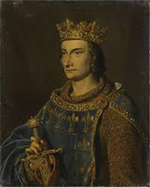The French King Philip III
Philip III was King of France for a decade and a half during the 13th Century. His reign saw the expansion of the royal holdings but was marred by military defeats. 
He was born on May 1, 1245, at Poissy. His father was the reigning monarch, King Louis IX. A gentle, almost timid boy, Philip lived much of his early life in the shadow of his older brother, Louis, who was the heir to the throne. The younger Louis died in 1260, and everything for Philip changed. He became the heir, and his father named him Count of Orléans. Philip married Isabella of Aragon on July 6, 1262; they had four sons, including Philip IV. She died in 1271. Philip married again in 1274, to Marie of Brabant; they had a son and two daughters (including Margaret, who married England's King Edward I. Philip was 25 when he accompanied his father on the Eighth Crusade. The army was at Carthage in 1270 when dysentery ripped through the camp. Among the dead was King Louis. Thus, Philip became king. Right away, he implored his uncle, Charles I of Naples, to negotiate a truce with the Muslim leader of Tunis. King Philip III returned to France and was eventually crowned, on Aug. 15, 1271. Philip supported his uncle during the 1282 rebellion known as the Sicilian Vespers, going to his aid at the head of an army a few years later in Aragon, Spain. After initial success, the French army alienated the local population and then Philip suffered defeat at the Battle of the Col de Panissars, on Oct. 1, 1285. He died of dysentery four days later, at Perpignan. The new king was his son, who became Philip IV. Philip III did have some success enlarging the amount of land owned by the royal house, notably by marrying his oldest son to Joan of Navarre in 1284, thus gaining Navarre. During his reign, the king also acquired Poitiers, Toulouse, and a handful of other collections of land. |
|
Social Studies for Kids
copyright 2002–2026
David White




